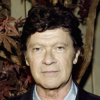Robbie Robertson

Robbie Robertson
Jaime Royal "Robbie" Robertson, OC, is a Canadian singer-songwriter and guitarist best known for his work as lead guitarist and primary songwriter for The Band. As a songwriter, he is credited for "The Weight", "The Night They Drove Old Dixie Down", "Up on Cripple Creek", "Broken Arrow", "Somewhere Down the Crazy River", and many others. He has been inducted into the Canadian Songwriters Hall of Fame and was ranked 59th in Rolling Stone magazine’s list of the 100 greatest guitarists...
NationalityCanadian
ProfessionRock Singer
Date of Birth5 July 1943
CityToronto, Canada
CountryCanada
I never really had a teenage experience. I went from childhood to maturity, and in some ways, it short-circuited me emotionally.
The native music of North America, the original-roots music of this country, is also the underworld music of this country.
I feel so lucky to have been in a group where it was a real band. This wasn't a singer and guitar player and some other guys.
I asked Bob Dylan to paint the album cover for 'Music from Big Pink.' He said, 'Yeah, let me see what I can come up with.'
My thirst for knowledge and experience comes from the idea that once you learned something, it was time to learn something else. I missed out on a formal educational process, so I'm making up for that.
I am fascinated by the places that music comes from, like fife-and-drum blues from southern Mississippi or Cajun music out of Lafayette, Louisiana, shape-note singing, old harp singing from the mountains - I love that stuff. It's like the beginning of rock and roll: something comes down from the hills, and something comes up from the delta.
The Band was rebelling against the rebellion. The rebellion went to a place where it became too obvious, too trendy, like you were just following the pack. So it was our choice to get off the bandwagon - no pun intended - and do things that were in our background and what was the most honest thing to do.
The kid at 9 or 10 who knows who Billie Holiday is... that's the coolest thing ever.
A lot of times when you're making a record, you put your head down and charge forward until you're done. You just hope that the ideas hold up, because you're kind of lost in your own storm.
When you look at that period when Warhol and the Velvets and the Stones were doing things, it was this intersection of art and music. And then it went away.
The previous collections that have been done on The Band were OK,
The Band is probably the ultimate example of people taking all kinds of music, from gospel to blues to mountain music to folk music to on and on and on and on and putting them all in this big pot and mixing up a new gumbo.
It made me look like I all of a sudden stumbled upon my heritage. It's not like that. You don't stumble upon your heritage. It's there, just waiting to be explored and shared. But what you need is a sign that somebody wants to share this with you.
It's easy to be a genius in your twenties. In your forties, it's difficult.